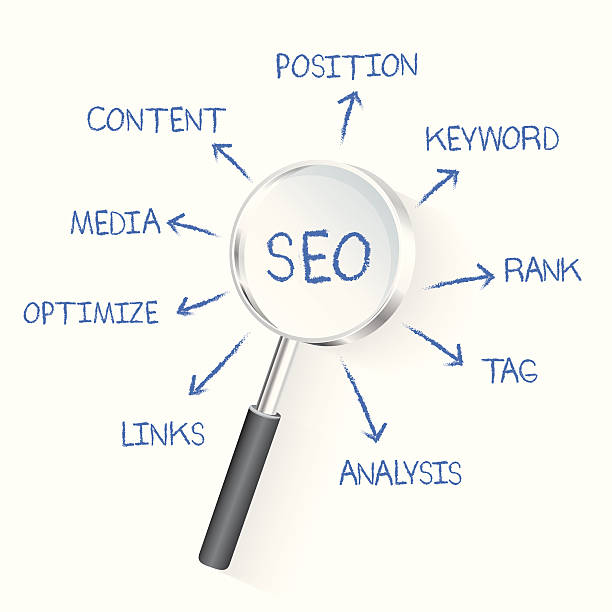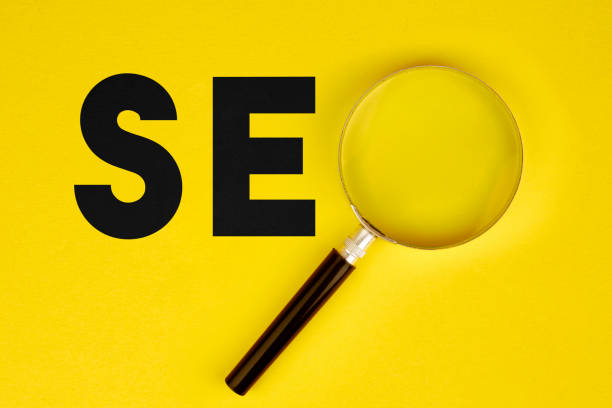What is SEO and Why is it Vital for Your Online Business?

What is SEO and Why is it Vital for Your Online Business?
SEO stands for Search Engine Optimization and refers to optimizing a website for search engines such as Google, Bing, and Yahoo.
The main goal of SEO is to increase the website’s ranking in search results for keywords related to your business.
This means attracting more organic (non-paid) traffic to the site, which in turn increases brand awareness, attracts potential customers, and ultimately increases sales.
In today’s digital world, SEO plays a very important role in the success of any online business.
Imagine you have an online store that offers quality products, but no one knows about it.
SEO helps you optimize your site so that when your potential customers search for similar products on Google, your site appears in the search results.
With a higher ranking, there is a higher probability that users will click on your site’s link and enter your site.
If your site does not appear on the first pages of search results, your potential customers are likely to go to your competitors.
Studies have shown that most users only pay attention to the results on the first page of Google and rarely visit subsequent pages.
Therefore, investing in #SEO is a long-term and necessary investment for any online business that wants to succeed in today’s competitive market.
By optimizing your site for search engines, you can attract more organic traffic, increase your brand awareness, and ultimately increase your sales.
This process requires knowledge, experience, and patience, but the results can be very valuable.
Do you dream of a thriving online store but don’t know where to start?
Rasaweb is your comprehensive e-commerce website design solution.
✅ Attractive and user-friendly design
✅ Increased sales and revenue⚡ Get free consultation
Introduction to key SEO concepts: Keywords, On-Page SEO, and Off-Page SEO

Introduction to Key SEO Concepts: Keywords, On-Page SEO, and Off-Page SEO
To start the SEO process, it is essential to understand its key concepts.
The three main concepts in SEO are keywords, On-Page SEO, and Off-Page SEO.
Keywords: These are words and phrases that users enter into search engines to search for specific information, products, or services.
Choosing the right keywords is the first step in the SEO process.
You should choose words that are both relevant to your business and searched for by your potential customers.
There are various keyword research tools available to help you find the right keywords.
These tools include Ahrefs and Ubersuggest.
On-Page SEO: Refers to the set of actions you take within your website to improve your website’s ranking in search results.
These actions include content optimization, title and meta description tag optimization, URL structure optimization, site loading speed optimization, and more.
On-page SEO helps you show search engines what your site is about and how relevant it is to your target keywords.
Off-Page SEO: Refers to the set of actions you take outside of your website to improve your website’s ranking in search results.
The most important action in off-page SEO is link building.
Link building means getting links from other websites to your website.
The more links you receive from reputable and relevant websites, the better your website’s ranking in search results will be.
Of course, the quality of the links is much more important than their quantity.
Spam and irrelevant links not only do not help your site’s SEO, but may also harm it.
By understanding these key concepts, you can start planning and implementing your SEO strategy.
Keyword Research: Finding the Best Phrases to Attract Targeted Traffic

Keyword Research: Finding the Best Phrases to Attract Targeted Traffic
Keyword research is the cornerstone of any successful SEO strategy.
Without keyword research, you don’t know what your potential customers are looking for in search engines and how to optimize your content to attract them.
The goal of keyword research is to find the best phrases that are both relevant to your business and searched for by your potential customers.
Keyword Research Tools: There are various keyword research tools available to help you find the right keywords.
Some of these tools are free, and others are paid.
Some of the most popular keyword research tools include:
- Google Keyword Planner (Free)
- Ahrefs Keywords Explorer (Paid)
- Ubersuggest (Free and Paid)
- SEMrush Keyword Magic Tool (Paid)
Important Criteria for Choosing Keywords: When choosing keywords, you should pay attention to a few important criteria:
- Search Volume: The number of times a keyword is searched in a given period (usually monthly) in search engines.
- Competition: The level of competition for a specific keyword.
The higher the competition, the harder it is to improve your site’s ranking for that keyword. - Relevance: The degree of relevance of a keyword to your business.
Keywords should be relevant to the products, services, or information you provide.
Types of Keywords: Keywords can be divided into several categories:
- Head Keywords: General and short keywords with high search volume but also very high competition (e.g., “shoes”).
- Long-Tail Keywords: Longer and more specific phrases with lower search volume but also less competition (e.g., “buy men’s sports shoes size 42”).
In general, it is best to use a combination of head and long-tail keywords in your SEO strategy.
| Keyword | Monthly Search Volume | Competition Level |
|---|---|---|
| Shoes | 100,000 | High |
| Buy Sports Shoes | 10,000 | Medium |
| Buy Men’s Sports Shoes Size 42 | 1,000 | Low |
Content Optimization for SEO: Creating Engaging, Valuable, and SEO-Friendly Content

Content Optimization for SEO: Creating Engaging, Valuable, and SEO-Friendly Content
Content is King! This famous phrase in the world of SEO demonstrates the immense importance of content.
For your site to rank well in search results, you need to produce engaging, valuable, and SEO-friendly content.
Engaging and Valuable Content: Your content should be engaging and valuable to your audience.
This means providing useful information, solving their problems, and answering their questions.
The more engaging and valuable your content is, the more time users will spend on your site and the more likely they are to share it with others.
SEO-Friendly Content: Your content should also be optimized for search engines.
This means using relevant keywords in the title, meta descriptions, body text, and image tags.
You should also make sure that your content has a proper structure and is easy to read.
Using headings, subheadings, lists, and images helps with content readability.
Important Tips for Content Optimization for SEO:
- Use Keywords: Use keywords naturally and without exaggeration in your content.
- Optimize Title and Meta Descriptions: The title and meta descriptions should be attractive and relevant to the page content and include the main keywords.
- Use Heading Tags (H1-H6): Use heading tags to organize your content and use keywords in the main heading tags (H1) and subheadings (H2-H6).
- Optimize Images: Use alt tags to describe your images and choose file names for your images with relevant keywords.
- Create Internal Links: Internal links help search engines understand the structure of your site and find related pages.
- Optimize Site Loading Speed: Site loading speed is an important factor in site ranking in search results.
By following these tips, you can produce SEO-friendly content that is both engaging for users and improves your site’s ranking in search results.
Are you disappointed by the low conversion rate of your online store? Rasaweb turns your online store into a powerful tool for attracting and converting customers!
✅ Significantly increased visitor-to-buyer conversion rate
✅ Unique user experience to increase customer satisfaction and loyalty⚡ Get a free consultation from Rasaweb!
Link Building: Building Authority and Increasing Ranking by Receiving Links from Reputable Sites

Link Building: Building Authority and Increasing Ranking by Receiving Links from Reputable Sites
Link building is one of the most important factors in off-page SEO.
Links show search engines that your site is reputable and valuable and deserves a higher ranking.
The more links you get from reputable and relevant websites pointing to your website, the better your website’s ranking will be in search results.
Types of Links:
- Internal Links: Links that point from one page on your site to another page on the same site.
- External Links: Links that point from other sites to your site.
- Nofollow Links: Links that tell search engines not to pass ranking value to the destination site.
- Dofollow Links: Links that tell search engines to pass ranking value to the destination site (by default, all links are dofollow).
Link Building Strategies:
- Produce Valuable Content: By producing valuable and engaging content, you increase the likelihood that other sites will link to you.
- Contact Webmasters: Contact webmasters of related sites and ask them to link to your site.
- Participate in Forums and Social Networks: By actively participating in forums and social networks, you can attract valuable links to your site.
- Advertising: By advertising your site on other sites, you can get paid links.
Important Tips for Link Building:
- Quality is More Important than Quantity: Quality links from reputable and relevant sites are more valuable than low-quality links from spam sites.
- Links Should be Natural: Links should not be created artificially and with the sole purpose of increasing site ranking.
- Pay Attention to Link Diversity: Links should be received from different sites and with diverse anchor text.
By implementing a proper link building strategy, you can increase your site’s authority and improve its ranking in search results.
Technical SEO: Optimizing Site Structure and Infrastructure for Search Engines
![]()
Technical SEO: Optimizing Site Structure and Infrastructure for Search Engines
SEO Technical refers to optimizing the structure and infrastructure of a site for search engines.
The goal of technical SEO is to ensure that search engines can easily find your site, crawl it, and index its content.
Technical SEO includes various items such as the following:
- Site Loading Speed: Site loading speed is an important factor in site ranking in search results.
- Mobile-Friendliness: Today, most users access the Internet via mobile.
Therefore, your site should be fully mobile-friendly. - Sitemap: A sitemap helps search engines understand the structure of your site and find all its pages.
- robots.txt file: The robots.txt file tells search engines which pages of your site they should not crawl.
- SSL Certificate: An SSL certificate guarantees the security of your site and assures users that their information is safe.
- URL Structure: URLs should be short, descriptive, and include relevant keywords.
- Fixing 404 Errors: 404 errors occur when a page on your site does not exist.
You need to find and fix 404 errors.
By optimizing the structure and infrastructure of your site for search engines, you can improve your site’s ranking in search results and attract more organic traffic.
User Experience (UX) Optimization: Increasing User Satisfaction and Improving SEO Ranking

User Experience (UX) Optimization: Increasing User Satisfaction and Improving SEO Ranking
User experience (UX) refers to the feeling and experience that users have when using your site.
The better the user experience, the more users will stay on your site, visit more pages, and the more likely they are to become your customers.
Optimizing user experience not only increases user satisfaction but also helps improve your site’s SEO ranking.
Search engines pay attention to user experience signals such as Bounce Rate, Time on Site, and Pages per Session and use these signals to rank websites.
Important Tips for User Experience Optimization:
- Responsive Design: Your site should be fully compatible with all types of devices (mobile, tablet, desktop).
- Fast Loading Speed: Users expect your site to load quickly.
- Easy Navigation: Users should be able to easily navigate your site and find the information they are looking for.
- Readable and Engaging Content: Your content should be readable, engaging, and relevant to users’ needs.
- Visually Appealing Design: Your site’s design should be attractive and professional.
- Call to Action: Use clear and engaging calls to action to guide users towards your desired goals.
| UX Factor | Impact on SEO |
|---|---|
| Loading Speed | Increased Ranking |
| Low Bounce Rate | Increased Ranking |
| High Time on Site | Increased Ranking |
SEO Tools: Introduction and Training on Using Practical Tools for Analysis and Optimization

SEO Tools: Introduction and Training on Using Practical Tools for Analysis and Optimization
SEO tools help you analyze your site, identify its problems, and improve your SEO strategy.
There are different SEO tools available, each with its own specific features and capabilities.
Some SEO tools are free, and others are paid.
Some Practical SEO Tools:
- Google Search Console: A free tool from Google that provides you with important information about how your site is performing in search results.
- Google Analytics: A free tool from Google that provides you with information about your site’s traffic, user behavior, and conversion rates.
- Ahrefs: A paid tool that allows you to analyze your site’s links, identify your competitors’ keywords, and find new link building opportunities.
- SEMrush: A paid tool that allows you to track your keywords, analyze your competitors, and improve your site’s SEO performance.
- Ubersuggest: A free and paid tool that allows you to research keywords, find new content ideas, and analyze your competitors.
- Moz Pro: A paid tool that allows you to comprehensively manage your site’s SEO.
By using these tools, you can continuously analyze your site, identify its problems, and improve your SEO strategy.
Remember that SEO tools are just tools, and success in SEO requires knowledge, experience, and patience.
Does your company website create a professional and lasting first impression on potential customers? With a professional corporate website design, Rasaweb not only represents the credibility of your brand but also opens a path for the growth of your business.
✅ Creating a powerful and reliable brand image
✅ Attracting target customers and increasing sales
⚡ Get free consultation
Measuring and Analyzing SEO Results: Tracking Performance and Evaluating Strategy Effectiveness

Measuring and Analyzing SEO Results: Tracking Performance and Evaluating Strategy Effectiveness
SEO is an ongoing process, and to make sure your SEO strategy is effective, you need to constantly measure and analyze its results.
Measuring and analyzing SEO results helps you understand what’s working and what’s not, and adjust your strategy accordingly.
Most Important Key Performance Indicators (KPIs) in SEO:
- Organic Traffic: The amount of traffic that comes to your site through organic search results.
- Keyword Ranking: Your site’s ranking for targeted keywords in search results.
- Bounce Rate: The percentage of users who leave your site after visiting one page, without visiting other pages.
- Time on Site: The amount of time users spend on your site.
- Conversion Rate: The percentage of users who take a desired action (e.g., buying a product, signing up for a newsletter, etc.).
Tools for Measuring and Analyzing SEO Results:
- Google Analytics: A free tool from Google that provides you with information about your site’s traffic, user behavior, and conversion rates.
- Google Search Console: A free tool from Google that provides you with important information about how your site is performing in search results.
- Ahrefs: A paid tool that allows you to track your keyword rankings, analyze your site’s links, and compare your SEO performance with your competitors.
- SEMrush: A paid tool that allows you to track your keywords, analyze your competitors, and improve your site’s SEO performance.
By using these tools and key performance indicators, you can accurately measure and analyze your SEO results and improve your strategy accordingly.
The Future of SEO: New Trends and Advanced Techniques for Success in the World of SEO

The Future of SEO: New Trends and Advanced Techniques for Success in the World of SEO
The world of SEO is constantly changing and evolving, and to be successful in this field, you must always be familiar with new trends and advanced techniques.
Search engines are constantly updating their algorithms, and these updates can have a significant impact on your site’s ranking in search results.
Some New and Important Trends in SEO:
- Voice Search: With the increasing use of voice assistants like Siri and Alexa, voice search has become more important.
You should optimize your content to answer voice queries. - Mobile Search: Most users access the Internet via mobile.
Your site should be fully mobile-friendly and provide a good user experience on mobile devices. - Video Content: Video content is very engaging and interactive and can help improve your site’s ranking in search results.
- Artificial Intelligence: Artificial intelligence is changing how search engines work.
You should use AI-based SEO techniques to improve your site’s ranking. - User Experience: User experience is an important factor in site ranking in search results.
You need to make sure your site provides a good user experience.
To be successful in the future of SEO, you must always be familiar with new trends and advanced techniques, constantly update your SEO strategy, and pay special attention to user experience.
Frequently Asked Questions
| Question | Answer |
|---|---|
| What is SEO? | SEO, or Search Engine Optimization, is a process to increase the quality and quantity of website traffic by improving the site’s ranking in the natural (organic) results of search engines such as Google. |
| What are the main types of SEO? | SEO is divided into three main categories: On-Page SEO, Off-Page SEO, and Technical SEO. |
| What does On-Page SEO include? | On-Page SEO includes optimizing elements within the website, such as keywords, title tags, meta descriptions, content, URL structure, images, and internal links. |
| What is Off-Page SEO? | Off-Page SEO refers to activities outside of the website that help improve its ranking, such as Backlink Building, Social Media Marketing, and Brand Mentions. |
| What is Technical SEO? | Technical SEO focuses on optimizing the technical aspects of the website to help search engines crawl and index it better. This includes site speed, mobile-friendliness, site structure, sitemaps, and the Robots.txt file. |
| What role do Keywords play in SEO? | Keywords are terms that users enter into search engines. Using relevant keywords correctly and purposefully in the content and site elements helps search engines understand the topic of your page and display it for related searches. |
| What is a Backlink and why is it important? | A backlink, or incoming link, is a link from one website to another. Backlinks act as a “vote of confidence” from other sites for search engines and play an important role in the credibility and ranking of the site, especially if they are from reputable sites. |
| What impact does high-quality content have on SEO? | High-quality, relevant, comprehensive, and unique content not only attracts and retains users but also shows search engines that your page is valuable. This helps to improve ranking, reduce bounce rate, and increase user time on site. |
| Why is site loading speed important for SEO? | Site loading speed is an important ranking factor for Google. Faster sites provide a better user experience, have lower bounce rates, and are preferred by search engines. |
| Is SEO a one-time process? | No, SEO is a continuous and long-term process. Search engine algorithms are constantly changing, competition is increasing, and site content also needs updating. Therefore, SEO requires continuous monitoring, analysis, and optimization. |
And other advertising services of Rasa Web Advertising Agency
Smart SEO: A dedicated service for growing website traffic based on intelligent data analysis.
Smart Social Media: A new service to increase customer acquisition through attractive user interface design.
Smart Website Development: A new service to increase sales through marketing automation.
Smart SEO: Professional optimization for online growth using key page optimization.
Smart Marketplace: A fast and efficient solution to attract customers with a focus on attractive user interface design.
And more than a hundred other services in the field of internet advertising, advertising consulting, and organizational solutions
Internet Advertising | Advertising Strategy | Advertorial
Resources
SEO Tutorial
,What is SEO?
,Comprehensive SEO Guide
,SEO Tutorial
? For sustainable business growth in the digital world, Rasaweb Afarin Digital Marketing Agency is always with you with its comprehensive services from secure website design and search engine optimization to targeted advertising campaigns. Experience a powerful and successful online presence with Rasaweb Afarin.
📍 Tehran, Mirdamad Street, next to the Central Bank, South Kazeroun Alley, Ramin Alley No. 6



